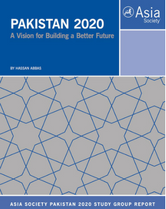
Pakistan 2020: A Vision for Building a Better Future
In recent years, Pakistan has stumbled from one crisis to another. A number of political and socioeconomic challenges threaten to further destabilize a country that already is reeling from insurgencies along its northwestern border. Pakistan’s newest democratic government is struggling to maintain control over parts of its territory where militant religious groups are intent on challenging its authority and legitimacy. The country’s conflict with India over Kashmir, now in its seventh decade, appears as intractable as ever, and the war in neighboring Afghanistan has deepened instability throughout Pakistan. The transition from a near-decade-long rule under a military dictatorship is slow and complicated, as rampant corruption and politicization of the bureaucracy present huge obstacles to the state-building process.
Although Pakistan’s vibrant civil society, relatively open media, and the rise of an independent higher judiciary provide some glimmers of hope, poor economic and development indicators coupled with worrying demographic trends pose serious challenges to the well-being of millions of Pakistanis. Energy shortages have worsened in recent years, and the destruction caused by the floods of 2010 has exacerbated the country’s many strains. In short, how Pakistan manages these challenges in the coming years will have great consequences for its future prospects.
While recent reform efforts in the higher judiciary and constitutional amendments to strengthen democratic institutions and expand provincial autonomy signal a positive trajectory for the country, sustaining democratic governance is complicated by radicalization and violence perpetrated by an intolerant and extremist minority in the country. Terrorist attacks on respected and cherished Sufi shrines throughout Pakistan and high-profile assassinations—including the January 2011 killing of Salman Taseer, the governor of Punjab, and the assassination of Shahbaz Bhatti, Pakistan’s only Christian cabinet minister, in March 2011—illustrate the lengths to which religious extremists in Pakistan will go to silence opposition voices in the country. And rather than condemning these acts of vigilante justice as un-Islamic, the government’s slow and timid response to the violence has allowed voices of intolerance to gather strength.
Preventing Pakistan from further deterioration will require a sustained, long-term commitment from the government of Pakistan, the United States, and other international stakeholders to promote genuine reform in the coming decade. This commitment must be enshrined in a comprehensive package of policies aimed at promoting sustainable constitutional democracy, credible and effective rule of law and law enforcement, a significant expansion and improvement of the education and health sectors, and a peaceful resolution of the conflict with India. Economic growth and foreign investment in Pakistan arguably will follow such progress.
In Pakistan, there is a growing consensus about the need for reform, but the resources and will that are required to plan, support, and implement such an agenda remain elusive. In this context, the role of private and public sector media in preparing Pakistani society and the state for competition in the global economy and in creating a culture of innovation cannot be overlooked.
For this report, the Asia Society Pakistan 2020 Study Group focused on seven core issues that are essential to realizing a sound future for the country by 2020: (1) strengthening democratic institutions; (2) strengthening the rule of law; (3) improving human development and social services, especially in health and education; (4) developing the energy infrastructure; (5) assisting the victims of the 2010 flood in their recovery; (6) improving internal security; and (7) advancing the peace process with India. This report is not meant to represent a consensus among all the members of the Pakistan 2020 Study Group. Rather, it presents the findings and conclusions reached by the project director and the report’s principal author, Hassan Abbas, through consultations with Study Group members. While individual members may disagree with parts of the report, the Group broadly supports the overall set of recommendations.


